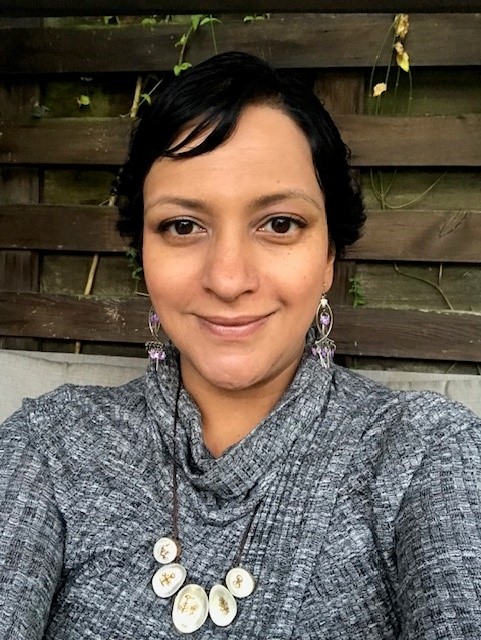Sweta’s project entitled ‘Hair and Care’ was awarded for a Future Leaders Fellowship (FLF) in 2022
Congratulations on your FLF grant! How did you celebrate the award?
Winning the UKRI Future Leaders Fellowship grant is easily the highlight of my career so far. It has been a labour of love and I have been supported by a fantastic team at Kent including mentors, grant advisors and our peerless research and innovation team. I celebrated with my family and had an informal “High Chai” celebration at my home for the research services team.
Could you give us a brief outline of what your project entails?
It explores an under-studied area of hair-based (texture) discrimination experienced by Black children and young people in education and social care settings in England. The central thrust of the FLF project is to develop a new field of inquiry that marries social work, race and ethnicity studies and new materialist inquiry together, through an affective engagement with hair texture and its meanings for Black identity as narrated and experienced by children.
What led you to this area of research?
For a decade now I have been interested in the relationship between everyday racism, racialisation and embodiment. My post-doctoral work explored transnational service work in Indian call centres and corporeal imaginaries used by call operators who would change their names and accents to appeal to a western customer base. The body (in this case the disembodied voice at the end of the phone) is constantly negotiating and performing whiteness in order to evade racist attacks from customers. As BSA Race and Ethnicity Study group convenor, I had organised an interdisciplinary conference on race embodiment and later life, and it was through these generative dialogues, especially from our keynote speaker Emma Tarlo, that my interest in dress and the racial politics of hair and Black identity intensified.
Did you approach any other funders with a similar project before being awarded the FLF?
I was very fortunate to receive the University of Kent Faculty Award to support a pump prime funding ethnographic project examining the construction of Black identity in Afro hair salons in Brixton. Thi stwo year ethnographic project rendered rich and exciting insights into the social importance of hair practice in the Black community. I also worked with colleagues in the School of Art and we received funding from the Arts Council England to curate an art exhibition on Hair and the Textures of Belonging. These experimental and innovative early projects provided a perfect launching pad for the FLF application.
How did you find the FLF application process?
The FLF application process is a hugely time-intensive commitment, and it took a good two years to develop the project proposal. The support I have received with my FLF application within LSSJ has been second to none. From the internal sift, to interview preparation after I was short listed, I received excellent mentoring and support from senior colleagues, the DoRI and the R&I team. I would recommend applying for the FLF and especially attending information sessions early on in the process.
What do you hope will be gained from your project, personally and societally?
My FLF project has several ambitious objectives. At the meta-level, it seeks to develop a new and emergent field of new materialism, race and affect studies in conversation with social work. At a societal level, the project forefronts Black children and young people’s voices in relation to how they curate their identity through hair practice; and informs institutional barriers and enablers in addressing texture-based discrimination. Potential impacts include policy recommendations for adoption and fostering social work teams in improving outcomes for Black children in transracial adoption placements. There are also significant implications for educational policy and addressing racial inequalities in schools by addressing biases in uniform codes and how it is used to discipline and control Black bodies in school settings. Personally, this is a very exciting time for me and I hope to embrace my inter-disciplinarity and continue to innovate and find new ways of addressing racial inequalities through embodied practice.
Where can we find more information on your research?
I will shortly be updating my website with a dedicated link for the FLF project. In the meantime, more information can be found on the UKRI website.
Interview by Sian Robertson, LSSJ Research & Innovation Coordinator

